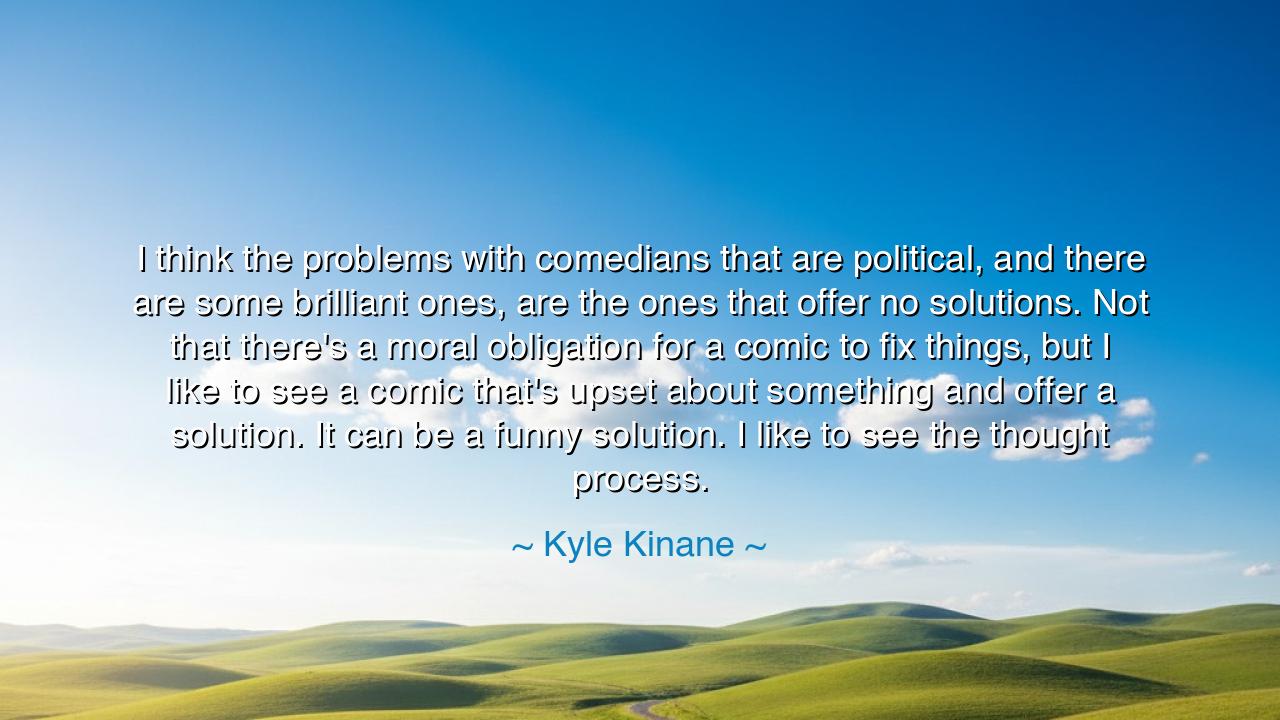
I think the problems with comedians that are political, and there
I think the problems with comedians that are political, and there are some brilliant ones, are the ones that offer no solutions. Not that there's a moral obligation for a comic to fix things, but I like to see a comic that's upset about something and offer a solution. It can be a funny solution. I like to see the thought process.






When Kyle Kinane said, “I think the problems with comedians that are political, and there are some brilliant ones, are the ones that offer no solutions. Not that there’s a moral obligation for a comic to fix things, but I like to see a comic that’s upset about something and offer a solution. It can be a funny solution. I like to see the thought process,” he was not only speaking of comedy — he was speaking of the moral dimension of thought itself. In his words burns the ancient fire of the philosopher, the satirist, the truth-seeker: the belief that laughter, when guided by wisdom, has the power to illuminate, not merely to destroy. For Kinane, humor is not only rebellion — it is reflection. It must not end with anger, but travel onward toward understanding.
The origin of this thought lies in Kinane’s respect for comedy as a craft of consciousness. In an age where the stage often becomes a pulpit of outrage, he reminds us that the comic’s duty is not only to point at the darkness, but to light a small candle within it. He does not demand moral preaching — only thought. For satire that merely ridicules without imagining better possibilities is like thunder without rain: loud, dramatic, but fruitless. Kinane admires those comedians who do not stop at mockery, who push further — through the absurdity, through the anger — until they uncover the strange beauty of human resilience, the humor of hope.
The ancients, too, understood that wit without wisdom is hollow. Aristophanes, the great playwright of Athens, used laughter as both weapon and balm. In his comedies, he mocked the corruption of the powerful, but he also imagined worlds of renewal — like Lysistrata, where women end war through wit and unity. His humor, biting though it was, carried within it a vision of restoration. He did not merely tear down; he built in laughter the architecture of possibility. Kinane’s philosophy mirrors this lineage: he sees comedy not as destruction, but as alchemy, the art of transforming the lead of rage into the gold of insight.
In his words we hear a call to responsibility through creativity. To speak of the world’s ills — whether in art, politics, or conversation — is easy. To offer even a glimmer of remedy, even in jest, requires courage. Kinane’s “funny solution” is not about solving all things, but about daring to think differently, to show through humor that imagination itself is a kind of resistance. When we laugh at what could be, we begin to believe it might be so. For the mind that finds amusement in absurd possibilities is also the mind that has not surrendered to despair.
Consider the story of Voltaire, who through satire defied tyranny with wit sharper than any blade. His masterpiece, Candide, ridiculed blind optimism, yet his humor carried a seed of wisdom: that the world cannot be perfected by doctrine, only tended by care — “we must cultivate our garden.” Like Kinane, Voltaire understood that humor’s purpose is not to demolish but to awaken. The joke that merely burns leaves only ashes; the joke that enlightens leaves embers that warm and guide. Comedy, when it dares to think, becomes philosophy disguised as laughter.
Kinane also speaks to a deeper truth about authenticity. He admires not the comic who postures as a prophet, but the one who is genuinely “upset about something” — who feels, and thus thinks. For emotion without thought is noise, but thought without feeling is cold. The best comedy, like the best art, arises from this union: the heart’s ache meeting the mind’s clarity. The “thought process,” as he calls it, is the sacred bridge between those realms. It is the moment when the audience not only laughs but recognizes themselves in the absurdity. They see, through humor, their own complicity and their own capacity to change.
So, dear listener, let this be your lesson: when you speak of what is wrong, do not stop there. In your laughter, your critique, your art, or your anger — strive to go further. Ask not only “What is broken?” but also “What might mend it?” Do not fear to make your solution funny, small, or strange — for even the slightest flicker of imagination pushes back the dark. As Kyle Kinane teaches, the power of humor lies not just in exposing the world’s absurdities, but in reminding us that we are capable of thought, of hope, of change.
Thus, his words become a teaching for all who dare to speak truth: that laughter, when guided by conscience, becomes a form of light. It mocks what must fall but points toward what must rise. To be funny is not enough — one must also be thoughtful, for thought is what transforms laughter from mere sound into substance. And when laughter carries wisdom, it ceases to be entertainment alone — it becomes a quiet revolution, one that begins, as all revolutions do, with a single spark of imagination shared between souls.






AAdministratorAdministrator
Welcome, honored guests. Please leave a comment, we will respond soon